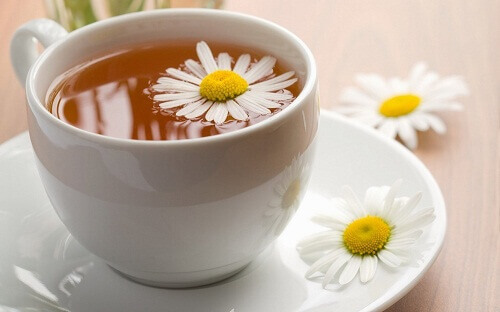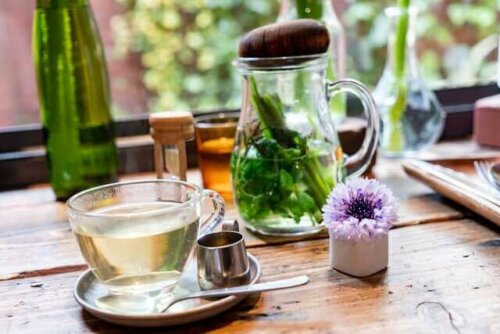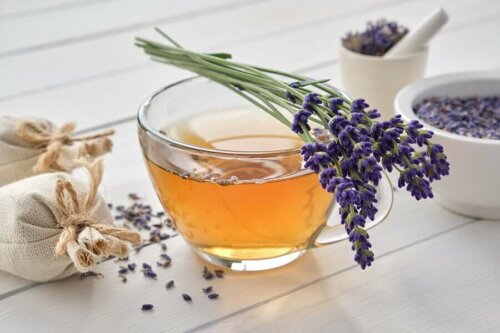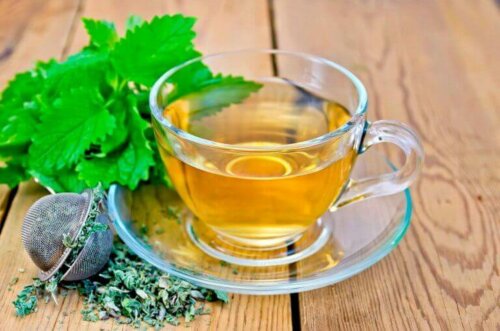The best natural sleeping aids

There are people who look for natural sleeping aids in order to relax their bodies and prevent any interruptions that cause them to have insufficient sleep. One of the most popular homemade products that help you sleep is chamomile tea. However, this drink is not the only option.
Lots of people around the world have trouble going to sleep at night. They wake up shortly after falling asleep and have a hard time going back to sleep again or they simply can’t stay asleep through the night to rest properly. Oftentimes, the cause of insomnia is stress or traumatic events.
Natural sleeping aids to help overcome insomnia
According to Dr. Karl Doghramji, the treatment of insomnia depends on the cause and its severity. In some cases, the treating physician may consider prescribing some type of drug. However, we must point out that drugs are not usually the first option.
When the symptoms of insomnia are mild, it may be enough to recommend the patient to take a series of standard remedies.
Good sleep hygiene is essential for our health. Hence, professionals recommend that we consider certain healthy actions. These include eating a light dinner, not consuming stimulants several hours before going to sleep, performing a ritual to promote relaxation, maintaining a sleep schedule, etc.
Let’s take a look at some of the natural sleeping aids that can help complement this ritual.
1. Chamomile

When consumed hot, chamomile tea is a drink that can comfort and promote relaxation. Additionally, it’s digestive, anti-inflammatory, and slightly sedating. Thus, it can be of help when dealing with mild insomnia.
To prepare it, you can opt for the presentation in teabags sold in supermarkets or the dried flowers that are sold in bulk by herbalists and teashops.
Ingredients
- 1 teabag of chamomile (or 30 grams of dried flowers).
- 1 glass of water (250ml)
Preparation
- Bring the water to a boil.
- Once it reaches its boiling point, add the chamomile bag or the flowers, cover it with a lid, and let it infuse for about 5 minutes.
- Uncover it and drink the tea calmly, by sips, at least an hour before going to bed.
This may interest you: Chamomile and Other Remedies that Improve Digestion
2. Valerian
The second world-renowned natural sleeping aid is valerian; a herb that also has sedative properties. It’s not only effective for cases of insomnia but can also help with stress and anxiety.
Unlike chamomile, it has a stronger aroma and taste, which is why many people accompany it with a few drops of lemon juice or honey (or both) to soften it.
Ingredients
- 1 tablespoon of valerian (3 grams).
- 1 cup of water (250ml).
Preparation
- Boil the water.
- Once it reaches the boiling point, add the valerian, cover it, and let it infuse for about 5 minutes.
- Strain, serve, and drink.
3. Passionflower

Also known as “passiflora“, the infusion of this herb can also help to relax the body and fall asleep. It’s not only advisable for insomnia, but also in cases of stress and anxiety. It also helps lower heart rate and blood pressure.
Ingredients
- 1 teaspoon of passionflower (2 grams)
- 1 cup of water (250 ml)
Preparation
- Boil the water
- Add the passionflower, cover it, and let stand for 5 minutes.
- Strain and serve.
- Sweeten with a touch of honey (if you like).
Important note: there are mixed infusions that contain valerian, chamomile, and passionflower.
4. Hops
Hops is another plant that has sedative effects. Thus, it’s also effective when dealing with insomnia. You can find it by itself or in mixed sleep infusions that include chamomile, valerian, or lavender. It can have a bitter taste, so people usually sweeten it with a little honey.
When preparing to consume this infusion, you should use approximately 10 grams of dried flowers for each liter of boiling water.
5. Kava Kava
Kava kava (Piper methysticum) is another herb that helps relieve stress, anxiety, tension, and insomnia. The drink is prepared with the pulp of the root of the plant and mixed with water or coconut milk.
Ingredients
- 1 tablespoon of kava-kava (3 grams)
- 1 cup of water (250 ml)
Preparation
- Boil the water.
- Add the kava and cook for about 5 minutes.
- Strain and serve.
- Add a little coconut milk if you wish.
6. Lavender

Lavender is a herb that has a delicious scent. For this reason, drinking its infusion is very pleasant as a ritual for falling asleep. Moreover, this herb is famous because it relaxes the nervous system, so it has a sedative effect that can help you fall asleep.
The tea is prepared the same way as the previous cases and you can add honey to make it taste sweeter.
Important note: people with epilepsy shouldn’t consume this infusion, nor should pregnant or lactating women. On the other hand, this drink shouldn’t be administered to children under the age of 6.
7. California poppy
The California poppy (Eschscholzia californica) isn’t one of the most popular natural sleeping aids, but even so, there are people who prefer it and know how to take advantage of it. It has sedative, analgesic, anti-inflammatory, vasodilator, and antihypertensive effects.
You can prepare its infusion with the edible oil that is extracted from the plant.
8. Lemon balm

Lemon balm, common balm, or balm mint (Melissa officinalis) is another common natural sleeping aid. It has relaxing, antispasmodic, sedative, and anxiolytic properties.
You can prepare it by itself or combine it with other plants like lavender and chamomile.
What do experts say about medications?
According to the professionals of the Sleep Research Institute, “we must avoid taking medications without a prescription. Each case must be separate, assessing the benefits of the treatment to determine if it’s ideal. At the Sleep Research Institue, we try not to prescribe hypnotics except in exceptional cases”.
Consuming over-the-counter sleeping pills is risky, so it’s best to take the option prescribed by the professional (if you consider it), and, at the same time, improve your sleeping habits. Therefore, it’s not advisable to self-medicate in any case.
All cited sources were thoroughly reviewed by our team to ensure their quality, reliability, currency, and validity. The bibliography of this article was considered reliable and of academic or scientific accuracy.
- Medina Ortiz Oscar, Sánchez-Mora Nora, Fraguas Herraez David, Arango López Celso. Valeriana en el tratamiento a largo plazo del insomnio. []. [ 2018 25] ; 37( 4 ): 614-626. Disponible en: http://www.scielo.org.co/pdf/rcp/v37n4/v37n4a11.pdf
- Pantoja Prosper Carlos, Rodríguez Sánchez Vivian Zuzel, Páez Ochoa Yaquerine, Rodríguez Hernández Rolando, García Aguilar Guillermo. Efectividad del tratamiento homeopático en pacientes con trastorno del sueño. MEDISAN [Internet]. 2016 Ago [citado 2018 Oct 25] ; 20( 8 ): 1078-1083. Disponible en: http://scielo.sld.cu/scielo.php?script=sci_arttext&pid=S1029-30192016000800010&lng=es.
- Sarrais F., de Castro Manglano P.. The insomnia. Anales Sis San Navarra [Internet]. 2007 [cited 2018 Oct 25] ; 30( Suppl 1 ): 121-134. Available from: http://scielo.isciii.es/scielo.php?script=sci_arttext&pid=S1137-66272007000200011&lng=en.
This text is provided for informational purposes only and does not replace consultation with a professional. If in doubt, consult your specialist.








